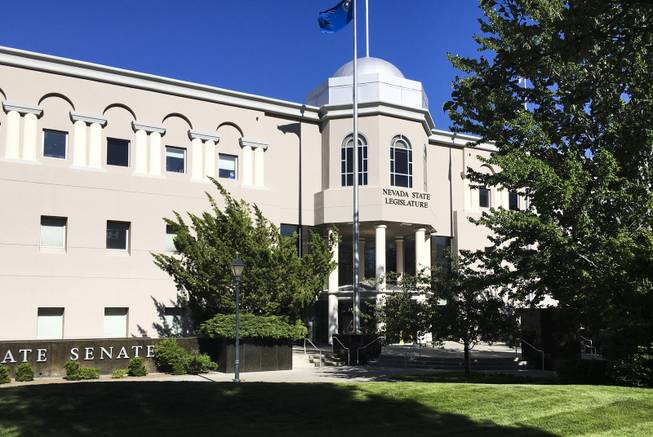Wednesday, April 24, 2019 | 1:31 p.m.
Another day, another deadline.
On Tuesday, the state Legislature passed its most recent deadline, requiring bills to be passed out of their house of origin. It was a marathon day, and while most remaining bills lived, some didn’t come out the other side.
Let’s take a look at the winners and losers.
What’s alive
A number of Democratic priorities survived the deadline.
• A gun safety bill designed to keep guns out of the hands of minors (Assembly Bill 153) passed the Assembly 32-9. “Assembly Bill 153 is not a gun storage bill, but rather a child access prevention bill,” said Assemblyman Ozzie Fumo, D-Las Vegas, one of the bill’s primary sponsors.
The bill makes it a misdemeanor crime to negligently store a firearm in a place where minors may be able to obtain it. It would not be a crime to leave a gun out of storage if a person does not have reason to know a child may access it.
Assemblyman Jill Tolles, R-Reno, supported the bill, saying it would hold people accountable for storing guns unsafely and keep children safe.
• A bill that would bar employers from denying employment to a candidate who has tested positive for marijuana (Assembly Bill 132) passed the Assembly 33-8.
The bill would allow employers to make abstention for marijuana a condition to keep the job, unless the employee holds a medical registration card.
• A bill banning bump stocks (Assembly Bill 291) sponsored by Oct. 1 survivor and Assemblywoman Sandra Jauregui, D-Las Vegas, passed 28-13.
Jauregui’s testimony in favor of the bill has been emotional throughout the session.
“You have all heard my story, and you have all seen my journey with this issue,” she said. “I have nothing left to say to convince you, but I would urge you, for the 58 people who lost their lives on October 1, 2017, to support Assembly Bill 291.”
The bill also allows counties to create more stringent gun regulations than the state and decreases the blood alcohol content a person can have while in possession of a firearm to .08 percent.
Assemblyman Tom Roberts, R-Las Vegas, took issue with the bill’s provision that counties can enact more stringent gun regulations, saying it could create problems with people traveling.
“I fear that the Legislature giving up preemption to counties could present us with a checkerboard of laws throughout the state that could put at risk individuals traveling intercounty who might not be aware of stark defenses in the laws between our counties,” he said.
Roberts said he supported the bill’s other provisions. The bump stock ban comes after the product was banned at a federal level.
• A bill restoring voting rights to certain felons (Assembly Bill 431) passed 32-9.
Speaker Jason Frierson is the primary sponsor of the bill and has pushed the legislation as necessary to ensure the democratic process.
The bill, which would grant voting rights to anyone not incarcerated, was introduced on the floor by Assemblyman Howard Watts, D-Las Vegas.
“This is going to make the process much more efficient for our elections and our corrections officials, but more importantly, it’s the right thing to do,” he said.
Assemblyman Chris Edwards, R-Las Vegas, said he could support the bill only if the re-enfranchisement of felons happened after they have finished their parole or probation period.
“I think that doing it immediately upon release is almost unfair to them, because they’re still trying to transition back into civilian life,” he said.
Fourteen states and Washington, D.C., allow felons to vote upon release. Maine and Vermont never take away the right to vote.
About 90,000 felons are estimated to be disenfranchised in Nevada.
What failed
The Tuesday deadline saw fewer losses than the April 11 deadline, but a few bills did fail to get through.
• Right-to-die legislation (Senate Bill 165) failed to pass before the deadline. The proposed bill would have allowed doctors to prescribe life-ending drugs to patients who met certain requirements.
This wasn’t the first time a right-to-die bill was brought before the Legislature. It had previously been brought before the body in both 2015 and 2017. Sen. David Parks, D-Las Vegas, has been involved with every push for the legislation’s passing.
The Death with Dignity National Center, an advocacy group for the issue, polled Nevadans on the issue in 2017 and 72 percent of respondents were in support.
• A bill that would have removed certain restrictions for people with marijuana-related convictions (Assembly Bill 346) failed, as well.
Under current law, people who have committed certain crimes cannot operate a child care facility, work at certain medical or child care facilities or work in certain recreation programs. The bill would have removed nonfelony marijuana convictions from the list of disqualifying crimes.
• A bill that would have denied local law enforcement the ability to detain people on an immigration hold unless there was another reason to keep them detained (Assembly Bill 281) is dead.
The bill would have excluded 287(g) agreements, under which local law enforcement can be deputized as an immigration enforcement officer and enforce immigration law.
• A proposed constitutional amendment that would have made judicial positions appointed rather than elected (Assembly Joint Resolution 9) failed to pass the deadline.
The resolution was scheduled to be heard on the floor but was removed from the agenda.
The next legislative deadline is May 17, when bills must pass committee in the second house.

